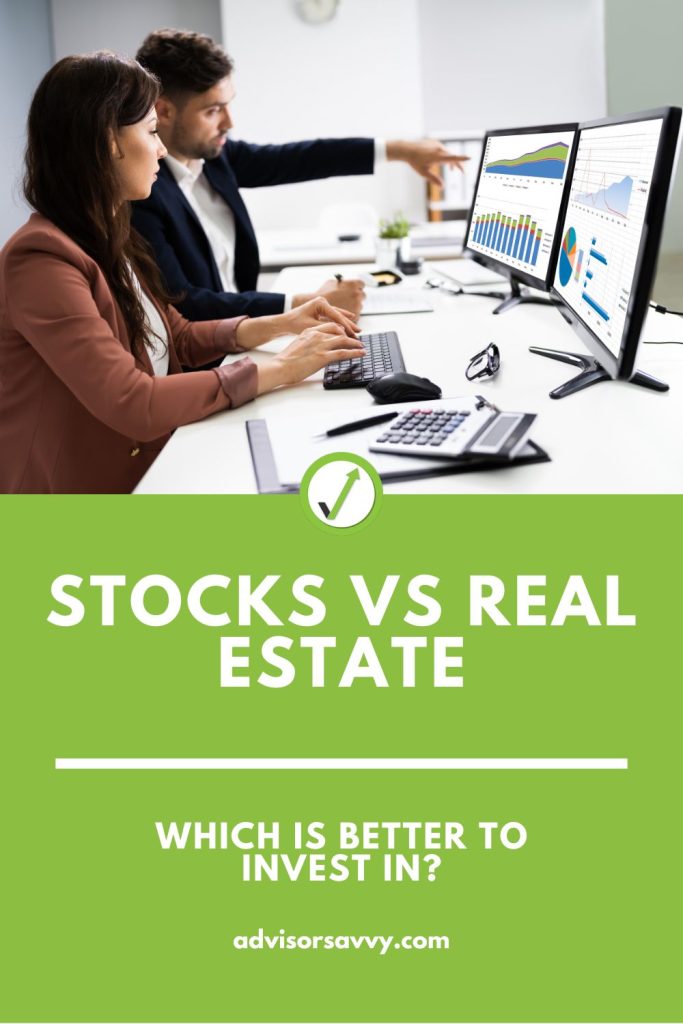
Real estate and stocks are two different assets available to investors. They both offer a return on investment. Beyond their returns, they also have different risk factors to consider. The question becomes, stocks vs real estate, which one is the most preferred asset for investment? In this article, we will discuss the various advantages and disadvantages of investing in stocks vs real estate. However, you may need to consider hiring a professional financial advisor to help you choose which asset is most suitable for your investment goals and specific personal finances. But for now, we’ve compiled the basic information for you below. Keep reading to learn more!

Table of contents
Stocks vs Real Estate: About Each Investment
Before we get into the nitty gritty, let’s define stocks vs real estate and identify their similarities and differences:
What is Stock?
A stock is a form of asset or share that anyone can buy and sell on a stock investment platform, stock exchange, or privately. The one responsible for owning or holding this security is known as a stockholder or shareholder. When you invest in a stock, you are buying a little piece of a company.
Over time, stocks tend to grow into a better part of an entity, making it a great investment option. Investors can earn money off stocks through investment income and capital gains. The buying and selling of stocks is usually done under government rules and regulations to protect investors and corporations. This also ensures that shareholders get the organization’s authority to hold the shares, thereby avoiding mismanagement.
What is Real Estate?
Real estate refers to the buying, selling, and constructing of real and physical property for investment purposes. It includes properties like lands, roads, structures, buildings, and more. The four common types of real properties are residential, commercial, industrial, and vacant land. Some real estate investments may not generate any income for you unless you sell it for profit or rent it out to a tenant.
Keep in mind that Real Estate Investment Trusts (REITs) are sort of a hybrid between stocks and real estate. They are technically a stock or share by nature, but the investment is primarily backed by real estate. For some, REITs are an optimal investment if you can’t decide between stocks vs real estate.
Differences between Stocks and Real Estate
Below are some of the main differences to note between investing in stocks vs real estate:
- Stocks are known as a person or company’s ownership of an external entity. On the other hand, real property can be purchased for commercial purposes to earn some passive income or for personal use that has the opportunity for appreciation.
- Compared to real estate, stocks are highly liquid and can be sold easily. Real estate is less liquid because a lot of factors could affect the selling process, such as economic conditions, available buyers, ability to improve the property, and so on.
- The stock price is often volatile, which affects the fundamentals and financial performance of the company. Real estate property price depends on factors such as size, location, and return from the property in the future. In addition, real estate prices tend to be more stable.
- The aim of real estate investment is usually achieved in a very long period, while in the case of stocks, it could either be for a short or long period.
- When a company performs well, it owes a dividend to the stockholders. Stockholders can also earn money by flipping stocks for profit in the short or long run. With real estate, investors can earn rental income or capital gains by selling the property for a profit.
Similarities between Stocks and Real Estate
Here are a few major similarities between investing in stocks vs real estate:
- Stocks and real estate are the most common investment options in Canada and for good reasons. Most Canadians invest in a hybrid of each.
- Both stocks and real estate investments can provide you with a steady cash flow to improve your savings and achieve your greater financial goals.
- They can both potentially yield high returns, when you make the appropriate investment decisions.
Related Reading: Estate Taxes in Canada
Stocks vs Real Estate: Advantages and Disadvantages
There are clear benefits and drawbacks of investing in stocks vs real estate, which is a personal choice, depending on your financial situation and goals. Let’s find out more below:
Advantages of Stocks vs Real Estate
Stock
- Easy to buy: The stock market allows the purchase of company shares easily. You can achieve your stock purchase through a broker, online, or a financial planner quite quickly.
- Benefits of a growing economy: As the economy grows, so will its earnings. This is because economic growth creates jobs that generate income, and eventually, sales.
- Stock investment does not require much money: Most retail brokers will allow you to buy and sell stocks without commission.
- Liquidity: Liquidity ensures that you sell your stock in the market at any time.
Real Estate
- Control and flexibility: Real estate owners have a level of control and flexibility over properties, renovations, and strategies. You can make decisions that will directly impact your investment returns. In addition, being a landlord provides a flexible lifestyle.
- Potential for cash flow: Another benefit of real estate investment is the potential for cash flow and passive income. It allows you to achieve a steady cash inflow through rental payments.
- Protection from inflation: Real estate investments serve as a shield against inflation. Your land and properties can appreciate over time, keeping you on track with outpacing inflation.
Disadvantages of Stocks vs Real Estate
Stock
- Risky: As a shareholder, you could lose your entire investment. If a company does poorly or goes under, investors will sell and cause the stock price to drop.
- Pay tax on gains: If you sell your stock for a profit, you will pay capital gains taxes. The only exception is if you hold your stock investments in a registered account, such as a TFSA or RRSP.
- Competition: Professional investors and stock traders have the knowledge to invest right. With good trading tools and financial plans at their disposal, you have some competition in the market.
- Common stockholders receive payment last: The most preferred stockholders get paid first if a company goes bankrupt. However, a balanced portfolio will protect you in such cases.
Real Estate
- Lack of liquidity: Selling a property may be tedious, take time, and may involve high transaction costs. If you need cash quick and decide to sell your real estate, it could bring about some financial problems.
- Market and location risks: Certain factors can influence the value of real estate including the market demand, property’s location, and local economic conditions. Investing during a downturn in the real estate market can cause decreased property values, which affects your investment returns.
- Requires initial investment funds: Purchasing properties usually involves capital like down payments and transaction costs. This can be difficult for interested persons yet to enter the real estate market. Beyond the initial investment, there are also ongoing costs for homeownership.
Related Reading: Guaranteed Investment Certificate: Advantages and Disadvantages
Stocks vs Real Estate: Which is better to invest in?
There is no sure answer as to which is a better option. Ultimately, your choice between stock vs real estate investment will depend on your goals, risk tolerance, and other personal needs. However, do not dismiss the importance of conducting research.
However, it’s safe to assume that more people invest in the stock market because it doesn’t involve as much capital. In other words, the barrier to enter the market is low. Purchasing a real estate property will require you to save up a down payment and build a healthy emergency fund. If you can’t afford real estate, especially if you are in high-cost areas like Toronto and Vancouver, it is more ideal to invest in stocks.
Are stocks more risky than real estate?
Yes. There are several benefits to investing in stocks. However, the risks of stocks are high as they can also fall 50% to 90% downwards which does not apply to real estate investment. With time, stock index funds will create a smoother return for investors involved.
Why stocks are better than property?
Stocks are not only liquid but also very quick and easy to sell. They can also be allocated into a 100% tax-free, registered account until you are ready to make withdrawals. Besides, a study shows that stock investment indexes earn approximately 10% more than real estate investment annually over the long term.
Is there a correlation between stocks and real estate?
Yes, both are investment types that can change in value due to certain factors and they are historically correlated with each other in the long run. The stock and real estate market is a major part of an investor’s financial system.
When one goes up, they both go up together and when one comes down, they both go down together. These two investments can influence the economy as well as the lives of the people involved.
Related Reading: Estate Planning Checklist for Canadians
Stocks vs Real Estate: Choosing Your Next Investment
Choosing between stocks vs real estate can be a challenging endeavor. Sometimes, the easiest way to make a decision is to consider your budget and savings. Out of the two options, real estate is more costly to invest in and maintain. Stocks only require an initial investment of a dollar amount of your choosing, then you can watch it grow in your portfolio. If you don’t have the cash flow to facilitate a real estate purchase yet, you run the risk of being asset rich but cash poor. Instead, you should consider investing your excess money into stocks over real estate. This way, you’re still growing your savings but not putting yourself into a tight financial situation. And who knows, maybe your stock investments will grow enough to support your first home purchase!
Another parting point of wisdom is that you should aim to invest in both stocks and real estate. It may not make sense to invest in both now, but successful investors have diversified portfolios. This means investing in stocks, real estate and other types of investments. Just remember to always consider your personal financial goals and current circumstances before making a final decision!
Read More: Bond ETF vs Stock ETF: Which is better?

